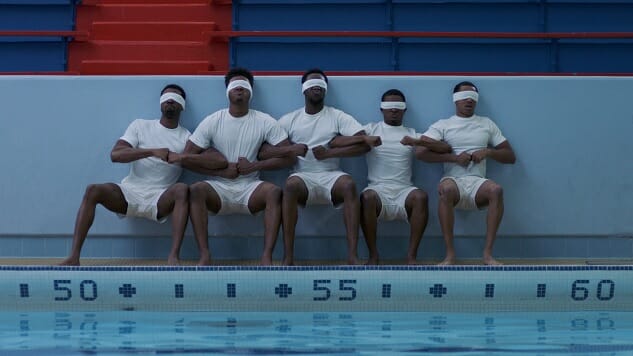
It takes a deft hand to make commentary on a subject without hardly commenting at all, so it stands to reason that Gerard McMurray is a deft-handed filmmaker. After serving as an associate producer on Fruitvale Station, Ryan Coogler’s sterling 2013 feature debut, and directing a pair of shorts, McMurray has made his own feature debut with Burning Sands, a smartly made fraternity drama bent around the topic of underground hazing. The film arrives on Netflix months after the release of Andrew Neel’s Goat, a true-life joint that focuses on similar material but possesses a different set of goals. Both McMurray’s movie and Neel’s movie concern themselves with frat culture’s pandemic of toxic masculinity, but the likenesses end there.
That’s because Goat mostly cares about toxicity and Burning Sands cares nearly as much about the manner in which it is spread. To an extent it’s a matter of legacy: McMurray’s protagonist, Zurich (American Crime’s Trevor Jackson), attends a fictional HBCU called, for reasons that become apparent ten minutes into the film, Frederick Douglas University, where he has been nominated by the dean (Steve Harris) to pledge for its most esteemed frat, Lambda Lambda Pi. Zurich’s story is all about succeeding where his father failed by getting into Lambda, a feat his father wasn’t able to achieve during his university days. Makes sense. Kids are often compelled to outdo their parents’ accomplishments, after all, and Zurich looks like he’s on the path to do just that. He’s good-looking, smart, well-liked by his teachers and his classmates alike, brimming with talent, and a week away from being a Lambda.
But the week in question happens to be Hell Week, which he and his fellow pledges must survive if they want to be part of, as the dean puts it in Burning Sands’ third act, “generations of tradition and honorable brothers.” And of course they want to be. There is a prestige and respect in the Lambda name, privileges conferred by frat status that any young man would leap through hoops for, though replace “hoops” with “verbal and physical abuses of ratcheting severity.” As is the norm for movies set in the frat world, Zurich and the four (five to start with; one quits for the sake of his dignity in the movie’s opening scene) students he’s pledging with endure all kinds of torment and humiliation as the week unfolds: It begins with fulfilling breakfast orders after a harsh early morning workout routine by a riverside, continues with the deconstruction of their self-worth, and ends with exactly what you might expect if you’ve seen this kind of movie before.
If you haven’t seen this kind of movie before, Burning Sands will snatch the breath right out of you, so let the faint of heart be warned. McMurray sticks closely enough to the frat drama blueprint that it’d be easy to write his work off for its familiarity: Anyone who has seen, say, Dazed and Confused, or the aforementioned Goat, is going to be well-acquainted with the kinds of maltreatment Zurich and company suffer in the name of fraternity throughout the film’s run time. What you might not anticipate are the racial undertones McMurray scatters across Burning Sands’ narrative, seeds of textual and subtextual affairs sown early on in a classroom discussion of methods slaveowners once used to control their slaves.
“I use fear, distress, and envy for control purposes,” a student reads aloud, and as Burning Sands progresses, we see each of these crop up in Lambda’s hazing rituals. The older pledge brothers, led by Fernander (Moonlight’s Trevante Rhodes), terrorize Zurich and the rest, depriving them of sleep, distracting them from their studies, and disrupting their social lives, the last of these being less of an issue depending on who you ask. (Square, played by future Dear White People star DeRon Horton, rushes Lambda for the purpose of acquiring a social life, which he lacks on his own but which he’ll be guaranteed as a member of Lambda.) As if heaps of grievous injuries aren’t a high enough price of admission, Zurich has to choose between his sense of individuality and his desire to be part of the frat collective.
It hardly seems like much of a choice at all, and yet movies like Burning Sands remind us of just how tempting an offer it is to hand off one’s soul in exchange for collegiate eminence. This, however, is of less interest than the parallels McMurray draws between fraternity hazing and slavery, and of the recurring Douglas quotes peppering his script (co-written with Christine Berg). “It’s easier to build strong children than to repair broken men,” states Professor Hughes (Alfre Woodard in a small role that she nonetheless commands absolutely) in an office session with Zurich. It’s her favorite of Douglas’ greatest hits, and the line that perhaps best summarizes Burning Sands’ intentions. But this dialogue poses a question the movie wisely declines to answer: By the time we hear it, isn’t it already too late? Zurich, who comprises Burning Sands’ center, breaks before the lesson is learned. McMurray’s film doesn’t end in tragedy so much as it commences with it.
Director: Gerard McMurray
Writer: Gerard McMurray, Christine Berg
Starring: Trevor Jackson, Alfre Woodard, Trevante Rhodes, DeRon Horton, Steve Harris, Serayah, Imani Hakim
Release Date: March 10, 2017 (Netflix)
Boston-based critic Andy Crump has been writing about film for the web since 2009, and has been contributing to Paste Magazine since 2013. He also writes for Screen Rant and Movie Mezzanine, and Birth.Movies.Death. You can follow him on Twitter and find his collected writing at his personal blog. He is composed of roughly 65% craft beer.